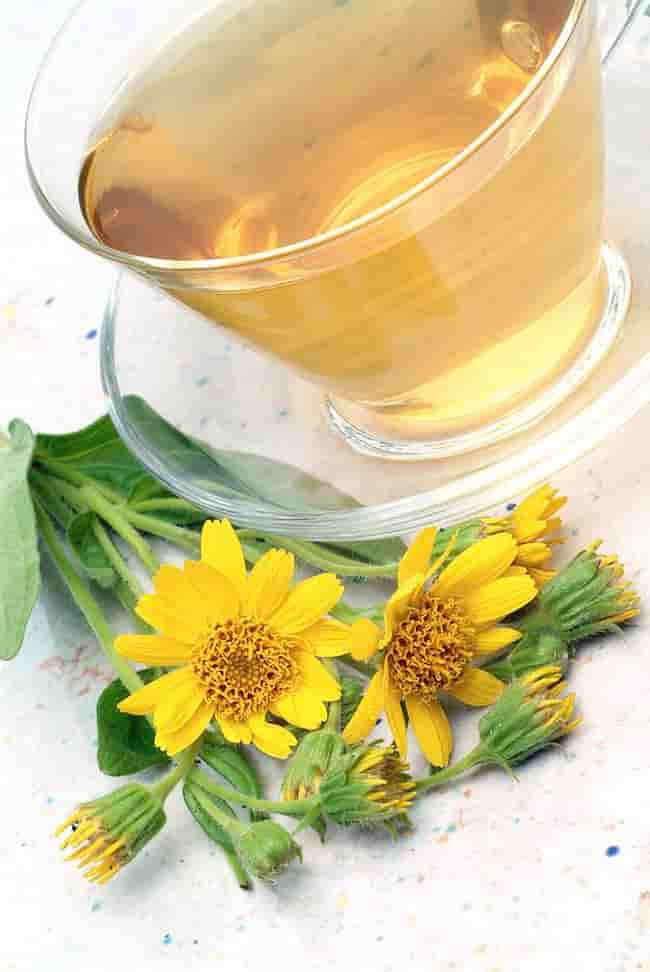Benefits of Arnica Tea and its Side Effects
Arnica is also known as “mountain tobacco”. It has been used since ancient times in Europe and the Americas for its medicinal properties. Emperor Charlemagne, who ruled much of Western Europe from 768 to 814 AD, drank an infusion of arnica every morning and night because he believed it would keep him healthy. This belief has not yet been verified by scientific studies, but there is evidence that arnica contains compounds that fight bacteria and fungi.
The flowers of the plant are dried and used to prepare infusions, tinctures, or ointments. The juice obtained from the plant combined with alcohol is recommended for bruises and inflammation associated with osteoarthritis. Leaves are used as a poultice for bruises and inflammation from arthritis or rheumatism, as well as for swollen joints.
In addition to its medicinal properties, arnica has been used by mountain climbers since the beginning of the twentieth century as a remedy against altitude sickness. However, it has not been proven that it can help fight this problem.
In the body, arnica breaks down into helenalin, a substance with anti-inflammatory effects that may explain some of its traditional uses as herbal medicine. However, some people are allergic to arnica and can develop contact dermatitis, which causes redness and swelling where the cream or ointment with arnica is applied.
Do not use if pregnant or breastfeeding. People who are allergic to daisies, marigolds, or any other member of the Asteraceae family should not take arnica. Do not apply topically on wounds or rashes. Consult with your doctor before use if you are taking blood thinners, have diabetes, or have an autoimmune condition.
Do not take orally without the advice of a doctor if you are pregnant or breastfeeding.
Arnica is known to cause dermatitis in people who are allergic to it, so use caution and consult with your doctor before use if you know you are allergic to this plant. Use cautiously if taking blood thinners, have diabetes, are pregnant, or breastfeeding
Arnica Tea Benefits after Surgery:
Although arnica has traditionally been used to treat inflammatory conditions, there is little evidence that it helps relieve swelling or inflammation due to any disorder, including surgery.
The use of oral (by mouth) or topical (applied to the skin) forms of arnica before surgery has been studied and no significant effects were found. The use of infused arnica tea after surgery has not been adequately studied. The safety of long-term applications of arnica-containing products is unknown.
Arnica Tea Side Effects:
Itching, redness, or swelling at the application site may occur. If these persist or worsen, stop using arnica and contact your doctor. Consult with your doctor before use if you are pregnant or breastfeeding. Keep out of reach of children. If swallowed, get medical help or contact a Poison Control Center right away.
Arnica Homeopathic:
The herb arnica is found in many homeopathic remedies. It is helpful for bruises, sprains, injuries to muscles and joints, rashes, swelling, inflammation of the skin, coughs, colds with fever, lymphatic congestion, gout, degenerative diseases of muscle tissue with impaired muscle tone, swelling of the glands, frequent need to urinate, bladder irritation with increased frequency and burning.
Arnica 30C is used for injuries with tissue damage or degeneration resulting in impaired blood supply. It is helpful for pain, skin redness, inflammation due to lack of oxygen (asphyxia) in tissues. It is also helpful for heart pain in the left side of the chest attributable to arteriosclerosis. Arnica 10M is used for cuts, bruises, swelling, and irritation with pain.
What is Arnica used for:
Arnica is an herb used for reducing pain and swelling from injuries. The German Commission E has approved the use of arnica for bruises, muscle pain, and swelling due to sprains or contusions.
The National Center for Complementary and Integrative Health reports that applying products made with arnica directly to the skin might make skin red and sensitive to sunlight. It is best to avoid excessive sun exposure when using products containing arnica, especially if the treated area is on the face or other highly exposed areas of the skin.
The National Center for Complementary and Integrative Health also reports that taking arnica by mouth might cause a slow heartbeat, dizziness, a feeling of being flushed, vomiting, and diarrhea. Pure powdered arnica is also extremely toxic and can cause death if ingested. Do not use arnica if you have heart disease or are prone to seizures.
Can I take Arnica for a sports injury?
There is no evidence that taking oral forms of this herb helps to improve sports performance or prevent sports injuries. It is also unclear whether topical use would be effective. Arnica might cause side effects, especially if you are allergic to arnica or other plants in the Asteraceae/Compositae family, such as ragweed, chrysanthemums, marigolds, daisies, and sunflowers.
Is Arnica safe to drink?
There is little information on the safety of taking arnica as a tea or using it as an ingredient in other forms such as creams and ointments. It might cause side effects, especially if you are allergic to arnica or other plants in the Asteraceae/Compositae family, such as ragweed, chrysanthemums, marigolds, daisies, and sunflowers. Speak with your doctor before taking arnica tea or using it in another form if you have a bleeding disorder or heart disease.
